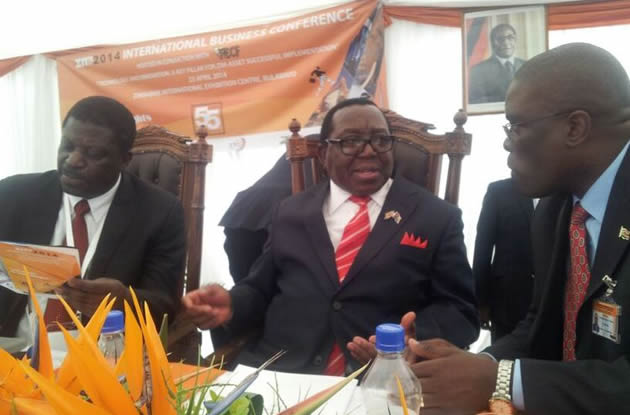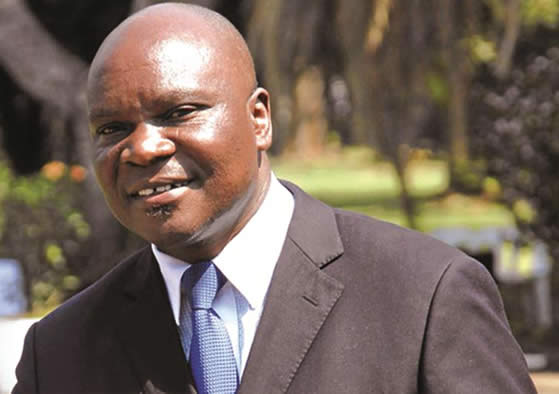Debt overhang deters funding . . . as Govt plots strategies to attract investors


Senior Minister of State in the President’s Office, Ambassador Simon Khaya Moyo (centre) speaks to Zimbabwe International Trade Fair board chairman Mr Bekithemba Nkomo (right) during the ZITF International Business Conference in Bulawayo yesterday while Industry and Commerce Minister Mike Bimha (left) looks at the programme. Ambassador Khaya Moyo opened the business conference on behalf of Vice President Joice Mujuru
Martin Kadzere in BULAWAYO
Zimbabwe has failed to secure funding on international markets due to concerns about its huge national debt overhang, Finance and Economic Development Minister Patrick Chinamasa has said.
Remarks by Minister Chinamasa come as Vice President Joice Mujuru said Zimbabwe was considering approaching Brazil, Russia, India, China and South Africa and far Eastern countries to seek funding for Zim-Asset programmes.
Speaking at the International Business Conference of the 55th Zimbabwe International Trade Fair yesterday, Minister Chinamasa said everywhere he has sought funding, the issue has cropped up.
“We are confronted with an economy which is heavily indebted, that is a reality I am facing, whether it is China or Malawi or the Bretton Wood Institutions (IMF and World Bank),” the minister said.
Against this background, Minister Chinamasa said the country needed investor friendly policies in order to attract foreign investment.
“We must be cognisant of the fact that the country needs foreign direct investment. So, we must come up with policies to attract FDI,” he said. Minister Chinamasa pointed
out that Zimbabwe was not the only country seeking FDI and should therefore have competitive policies, adding public private partnerships will be key to revive the economy.
On Tuesday at a Press briefing with AfrAsia Kingdom Bank, Minister Chinamasa said Government will soon revise its indigenisation policy to allow the injection of new money into the economy as a liquidity crunch has incapacitated locals to fund equity purchases and capitalise businesses.
“Cabinet will soon consider a comprehensive plan to be tabled by Youth Development, Indigenisation and Empowerment Minister Francis Nhema that will determine local participation in foreign-owned companies on a sector by sector basis.”
“I am very aware that with each increased injection of capital by foreign banks that will lead to dilution of the local participation. Where I stand right now I am quite comfortable with that dilution because it increases the volume of credit to the productive sector at a time when our own people have no capacity to buy the equity. So it’s going to be an incremental issue with respect to increasing local participation,” said Minister Chinamasa.
Speaking earlier at the same event on behalf of Vice President Joice Mujuru, Senior Minister in the Office of President and Cabinet Simon Khaya Moyo said that Zimbabwe would approach the BRICS and some Far Eastern countries to seek funding support.
The funding is meant to support programmes under the medium term plan, Zimbabwe Agenda for Sustainable Socio-Economic Transformation 2014 /18, which requires a total of $27 billion.
“The thrust of the economic blueprint is to open up business opportunities in all sectors of the economy. Successful implementation of the above programme needs to be complemented by supply side intervention, which will ensure adequate availability of goods and services for domestic and export markets.
“Efforts are currently underway to engage our regional counterparts as well as friendly cooperating partnerships such as countries in the Far East and of course the BRICS for the much needed finance and affordable working capital,” VP Mujuru said.
“Priority is on mobilising domestic resources, even the need for Zimbabwe to increase internal capacity to finance recovery including stepping up efforts to leverage our own resources particularly minerals.”
She said the Far East and BRICS offers potential for growth in financial and economic cooperation for Zimbabwe and the rest of Africa.











Comments